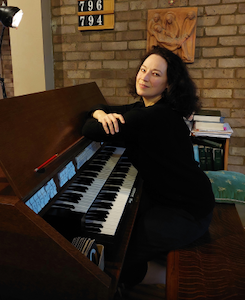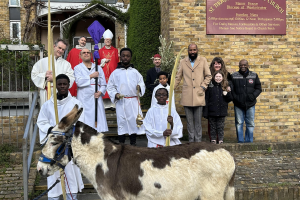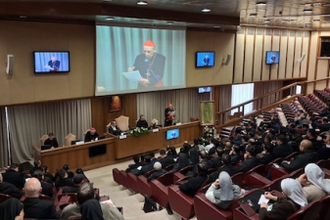Viewpoint: Musicians in churches

Patricia Hammond
Patricia Hammond writes:
A friend of mine recently completed a Bachelor of Music at Trinity Laban Conservatoire of Music and Dance, and it intrigued me that in addition to the usual classes in performance, theory and history, there were 'Artist As' modules - 'Artist As Citizen', 'Artist As Entrepreneur', 'Artist As Innovator'... community work, websites, unusual collaborations. This was refreshing to me. When I attended music college the whole thing had very little relation to the outside world. Just a suspension of disbelief as we all operated on the collective understanding we'd all end up in a red ballgown or white tie and tails, in front of a darkened, packed-out auditorium, alone on stage with our genius. Either that or we'd end up quietly as teachers.
So, well done Trinity Laban.
But Trinity missed out on a hugely important one: 'Artist In Places Of Worship.'
Is this too niche? Look at a map. How many churches are there per square mile? What other building in a community features music every single week, in front of a crowd of engaged people?
But that kind of gig is just for religious musicians, runs the assumption.
I have sung and played in Anglican, Unitarian, United Reformed, Lutheran, Christian Science and Catholic Churches, and was judged by nobody. In return I have gained as a musician to the degree that I can say I owe any success I might have in my full-time career directly to these performance opportunities.
Flautist Will Summers says it well: "Playing music in church is a discipline, it is an environment for music, as any other. You can have structure without orthodoxy. The nature of your own personal commitment is up to you."
My personal journey is for another time. I'd like this piece to be about you, or about any musicians you know. And with them in mind, here are a list of some surprising benefits of performing music in churches
(This is the Independent Catholic News, so I can can assume most people can think of the more transcendent or spiritual benefits for themselves!)
1. Improvement. Concert work exercises many performance muscles, but a place of worship will grow you holistically in ways you never thought possible. So many in fact that I need sub-categories.
- Multitasking. You are watching for cues, you are sight-reading, you are directing, you are working from several books. You are playing instruments with quirks. You are interacting with non-professionals. And nobody seems to notice when you make mistakes because you're not the focus. It's the perfect way to grow.
-Creativity. You get to alter things to suit so many situations. If you thought you couldn't reharmonise or improvise, you'll find out quickly that actually, you can.
-Chances to try things out. You have a new song, a new piece of music? Play it for the postlude! See how it goes down!
-Chances to redeem yourself. If you made a bit of a mess of the hymn, you have several more verses to make it right. If you still didn't do it as well as you felt you could, likely you'll do that same hymn a few weeks later, or even later in the day.
-Readiness. Francis Bacon said "Reading maketh a full man; conference a ready man; and writing an exact man". Music college will give you the reading and the writing but not nearly enough conference. Church music is all about collaboration, of back-and-forth between yourself, the congregation, any soloists who might need you, the Priest, Vicar or Pastor. Eventually, nothing will faze you!
-Teamwork. Related to the above. The ways you'll learn to listen to others will open up like a bouquet of flowers.
-Humility. Music is bigger than any of us, and we sometimes need to be reminded of that, in today's hustle culture. In a church you are a facilitator, an intermediary between music and people all around you.
2. Making a living. Obviously, churches are mostly cash-strapped. However they do often scrape together something to pay their organist and/or choir director. Take a look at: www.organistsonline.org to see who needs musicians in your local area. Or just ask around. There is a huge dearth of organists and choir directors right now. See how much they can afford, but keep in mind that there are many additional means of payment than the stated fee. First dibs on funerals and weddings, which can amount to a lot (see MU rates here And once you get known, you will be asked to perform weddings and funerals in other places too. And of course, keys to a rehearsal venue for your other projects. In London particularly, this is golden. Some churches even have accommodation. Also, a place to film videos for YouTube and other platforms. Even if they may be a bit reluctant to have you greeting your Instagram fans from the altar, there are spooky stairwells, minimalistic corners, ornate lofts or meeting rooms.
3. Community. How often do we musicians get a chance to build a relationship with the people we perform for? Every week at a place of worship, we can see the effects of music on fellow humans who get something meaningful from it. People notice when you did a particularly good job with a hymn, or harmonies for a psalm. And they'll tell you! One can monitor one's own performing this way, and learn something new to say in music, because there's someone to say it to! Psychologically, this connection can go a long way to ameliorating the sense of isolation many musicians can feel in a cut-throat, ageist, shallow field; a place where one is valued and connected to quite literally all age groups and many demographics.
4. Fun. Playing a hymn for a group of people, breathing with them in the phrasing, timing the gaps between verses, changing the sounds for each, bringing everyone together, gives a thrill unlike any other. It is like being a jumbo jet taking off from the runway, estimating the heft, the moment of lift-off. Again and again.
5. Contacts. At a church you never know who will hear you, and it will be outside your usual circuit. I won't namedrop but I've had a few real surprises. You will too, most likely.
6. Gaining of new skills. When I started playing the organ, the last time I'd played any keyboard was my grade 8 piano exam a good few years earlier. I was really a singer. But an organist was needed and I reckoned anything was better than nothing. There's something about doing a thing every week, and soon I found out that one didn't have to be a Fellow of the Royal College of Organists to be valued by a congregation. Virtuosity isn't as needful as being on time, being clear, and being a nice person. You don't need to play pedals right away. Just make sure you make a clear introduction, and phrase so that people can breathe! I have seen people branch out into becoming choir directors, collaborative musicians, fabulous sight-readers, music coaches and singers. The Royal School of Church Music is a great place to get training in all of these things, if you're so minded. Or just pick it up as you go, learning by doing. Or perhaps a church may wish to start a folk group. Here's your chance to put to good use those four chords you learned on the guitar in high school! You can often learn from others who join your team; I've been hugely honoured to collaborate with Cecil Cassell, a Soca legend whose rhythms are something I would never have encountered in any other professional area.
Playing music and leading music at these places can bring a lot of joy, both to yourself and others, and should be considered an integral part of the average musician's portfolio.
LINKS
Patricia Hammond on Youtube: www.youtube.com/patriciahammondsongs
Email: patriciahammondsongs@gmail.com
Website: https://patriciahammond.com/


















